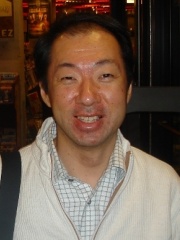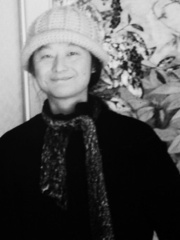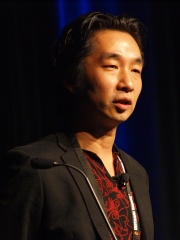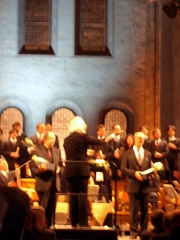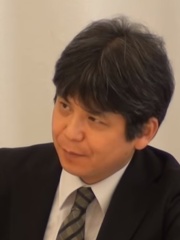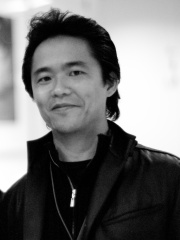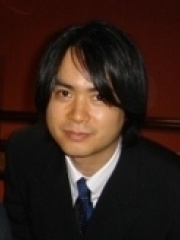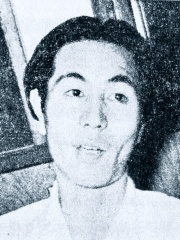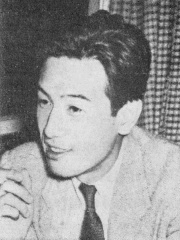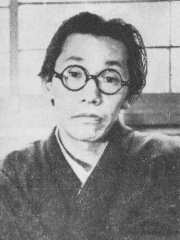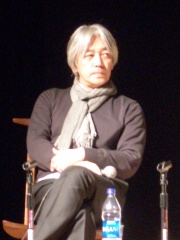

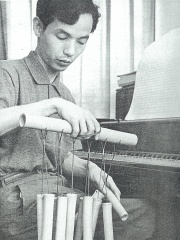
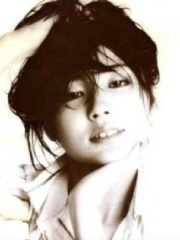
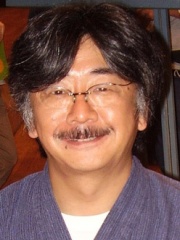
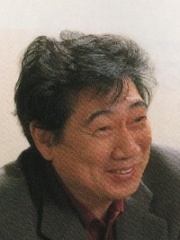
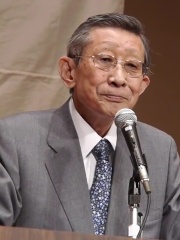
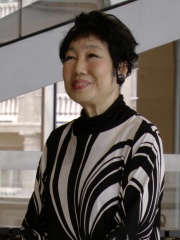
The Most Famous
COMPOSERS from Japan
Top 10
The following people are considered by Pantheon to be the top 10 most legendary Japanese Composers of all time. This list of famous Japanese Composers is sorted by HPI (Historical Popularity Index), a metric that aggregates information on a biography's online popularity. Visit the rankings page to view the entire list of Japanese Composers.

1. Ryuichi Sakamoto (1952 - 2023)
With an HPI of 71.04, Ryuichi Sakamoto is the most famous Japanese Composer. His biography has been translated into 47 different languages on wikipedia.
Ryuichi Sakamoto (Japanese: 坂本 龍一, Hepburn: Sakamoto Ryūichi; January 17, 1952 – March 28, 2023) was a Japanese musician, composer, keyboardist, record producer, singer and actor. He pursued a diverse range of styles as a solo artist and as a member of the synth-based band Yellow Magic Orchestra (YMO). With his YMO bandmates Haruomi Hosono and Yukihiro Takahashi, Sakamoto influenced and pioneered a number of electronic music genres. As a film score composer, Sakamoto won an Academy Award (Oscar), BAFTA, Grammy and two Golden Globe Awards. Sakamoto began his career as a session musician, producer, and arranger while he was at the Tokyo National University of Fine Arts and Music in the mid 1970s. His first major success came in 1978 as co-founder of YMO. He pursued a solo career at the same time, releasing the experimental electronic fusion album Thousand Knives in that year, and the album B-2 Unit in 1980. B-2 Unit includes the track "Riot in Lagos", which had a significant influence on the development of electro, hip hop and dance music. He went on to produce more solo records, and collaborate with many international artists, including David Sylvian, DJ Spooky, Carsten Nicolai, Youssou N'Dour, and Fennesz. Sakamoto composed music for the opening ceremony of the 1992 Barcelona Summer Olympic Games, and his composition "Energy Flow" (1999) was the first instrumental number-one single in Japan's Oricon charts history. Merry Christmas, Mr. Lawrence (1983) marked his debut as both an actor and a film score composer; its main theme was adapted into the single "Forbidden Colours" which became an international hit. His most successful work as a film composer was The Last Emperor (1987), for which he won the Academy Award for Best Original Score, making him the first Japanese composer to win an Academy Award. He continued earning accolades composing for films such as The Sheltering Sky (1990), Little Buddha (1993), and The Revenant (2015). On occasion, Sakamoto also worked as a composer and a scenario writer on anime and video games. He was awarded the Ordre des Arts et des Lettres from the Ministry of Culture of France in 2009 for his contributions to music. Sakamoto died on March 28, 2023 from colorectal cancer at the age of 71.

2. Ichirou Mizuki (1948 - 2022)
With an HPI of 67.48, Ichirou Mizuki is the 2nd most famous Japanese Composer. His biography has been translated into 95 different languages.
Toshio Hayakawa (早川 俊夫, Hayakawa Toshio; January 7, 1948 – December 6, 2022), better known by his stage name Ichirou Mizuki (水木 一郎, Mizuki Ichirō), was a Japanese singer, lyricist, composer, voice actor and actor best known for his work on theme songs for anime and tokusatsu. For over 50 years, he had recorded over 1,200 songs for Japanese film, television, video and video games. He was referred to by fans and fellow performers alike as the Aniki (アニキ, "big brother") of the anison, or anime music genre. He produced the singing duo Apple Pie since 1990 and created the Anison band JAM Project in 2000.

3. Toru Takemitsu (1930 - 1996)
With an HPI of 65.77, Toru Takemitsu is the 3rd most famous Japanese Composer. His biography has been translated into 38 different languages.
Tōru Takemitsu (武満 徹; pronounced [takeꜜmitsɯ̥ toːɾɯ]; 8 October 1930 – 20 February 1996) was a Japanese composer and writer on aesthetics and music theory. Largely self-taught, Takemitsu was admired for the subtle manipulation of instrumental and orchestral timbre. He is known for combining elements of oriental and occidental philosophy and for fusing sound with silence and tradition with innovation. He composed several hundred independent works of music, scored more than ninety films and published twenty books. He was also a founding member of the Jikken Kōbō (Experimental Workshop) in Japan, a group of avant-garde artists who distanced themselves from academia and whose collaborative work is often regarded among the most influential of the 20th century. His 1957 Requiem for string orchestra attracted international attention, led to several commissions from across the world and established his reputation as the leading 20th-century Japanese composer. He was the recipient of numerous awards and honours and the Toru Takemitsu Composition Award is named after him.

4. Miki Matsubara (1959 - 2004)
With an HPI of 64.53, Miki Matsubara is the 4th most famous Japanese Composer. Her biography has been translated into 27 different languages.
Miki Matsubara (松原 みき, Matsubara Miki; 28 November 1959 – 7 October 2004) was a Japanese singer and songwriter. She contributed to the opening and ending theme songs of the anime Gu-Gu Ganmo under the name Suzie Matsubara. Her 1979 debut song "Mayonaka no Door" became a hit, reaching No. 28 on the Oricon chart. Believing that her cancer diagnosis was the result of the lifestyle she lived during her career, Matsubara retired and severed all connections to the music world in 2000, dying from cervical cancer four years later at the age of 44. Since 2020, "Mayonaka no Door" has become widely known overseas due to its use on TikTok and the resurgence of the city pop genre.
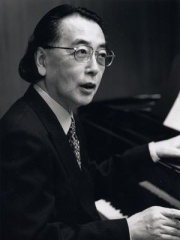
5. Toshi Ichiyanagi (1933 - 2022)
With an HPI of 61.46, Toshi Ichiyanagi is the 5th most famous Japanese Composer. His biography has been translated into 17 different languages.
Toshi Ichiyanagi (一柳 慧, Ichiyanagi Toshi; 4 February 1933 – 7 October 2022) was a Japanese avant-garde composer and pianist. One of the leading composers in Japan during the postwar era, Ichiyanagi worked in a range of genres, composing Western-style operas and orchestral and chamber works, as well as compositions using traditional Japanese instruments. Ichiyanagi is known for incorporating avant-garde techniques into his works, such as chance music, extended technique, and nontraditional scoring. Ichiyanagi was married to artist Yoko Ono from 1956 to 1962.

6. Nobuo Uematsu (b. 1959)
With an HPI of 60.17, Nobuo Uematsu is the 6th most famous Japanese Composer. His biography has been translated into 32 different languages.
Nobuo Uematsu (植松 伸夫, Uematsu Nobuo; born March 21, 1959) is a Japanese composer and keyboardist best known for his contributions to the Final Fantasy video game series by Square Enix. A self-taught musician, he began playing the piano at the age of twelve, with English singer-songwriter Elton John as one of his biggest influences in pursuing a musical career. Uematsu joined Square in 1986, where he first met Final Fantasy creator Hironobu Sakaguchi. The two later worked together on many games at the company, most notably in the Final Fantasy series. After nearly two decades with Square, Uematsu left in 2004 to create his own production company and music label, Dog Ear Records. He has since composed music as a freelancer for other games, including ones developed by Square Enix and Sakaguchi's studio Mistwalker. Many soundtracks and arranged albums of Uematsu's game scores have been released. Pieces from his video game works have been performed in various Final Fantasy concerts, where he has worked with conductor Arnie Roth and Game Concerts producer Thomas Böcker on several of these performances. Uematsu was also the keyboardist in The Black Mages in the 2000s, which played various hard rock versions of his Final Fantasy compositions. He has since performed with the Earthbound Papas, which he formed as the successor to The Black Mages in 2011. Uematsu has made several listings in Britain's Classic FM Hall of Fame, with the station referring to him as the Beethoven of game music.

7. Shunsuke Kikuchi (1931 - 2021)
With an HPI of 59.87, Shunsuke Kikuchi is the 7th most famous Japanese Composer. His biography has been translated into 18 different languages.
Shunsuke Kikuchi (菊池 俊輔, Kikuchi Shunsuke; 1 November 1931 – 24 April 2021) was a Japanese composer who was active from the early 1960s until 2017. He specialized in incidental music for media such as television and film. Kikuchi was regarded as one of Japan's most highly demanded film and TV composers, working principally on tokusatsu and anime productions, and also popular action films, jidaigeki, and television dramas.

8. Koichi Sugiyama (1931 - 2021)
With an HPI of 59.87, Koichi Sugiyama is the 8th most famous Japanese Composer. His biography has been translated into 22 different languages.
Koichi Sugiyama (すぎやま こういち, Sugiyama Kōichi; April 11, 1931 – September 30, 2021) was a Japanese composer, conductor, and orchestrator. He was best known for composing for the Dragon Quest franchise, along with several other video games, anime, film, television shows, and pop songs. Classically trained, Sugiyama was considered a major inspiration for other Japanese game music composers and was active from the 1960s until his death in 2021. Sugiyama was also a council member of the Japanese Society for Rights of Authors, Composers, and Publishers (JASRAC), board member of the Japan Institute for National Fundamentals, and honorary chairman of the Japanese Backgammon Society. Prior to his death, the Japanese government honored him with Order of the Rising Sun and named him a Person of Cultural Merit. Sugiyama was also active in politics and activism, promoting ideas such as Japanese nationalism while denying Japanese war crimes.

9. Keiko Abe (b. 1937)
With an HPI of 59.67, Keiko Abe is the 9th most famous Japanese Composer. Her biography has been translated into 22 different languages.
Keiko Abe (安倍 圭子, Abe Keiko; born April 18, 1937) is a Japanese composer and marimba player. She has been a primary figure in the development of the marimba, in terms of expanding both technique and repertoire, and through her collaboration with the Yamaha Corporation, developed the modern five-octave concert marimba.
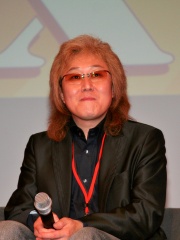
10. Kenji Kawai (b. 1957)
With an HPI of 57.97, Kenji Kawai is the 10th most famous Japanese Composer. His biography has been translated into 24 different languages.
Kenji Kawai (川井 憲次, Kawai Kenji; born April 23, 1957) is a Japanese music composer and arranger. Known as one of the biggest names in the soundtrack world, he has worked on a wide range of mixed media productions, including anime, TV shows, films, video games and ice shows. Among his credits are Toei's Kamen Rider Heisei Generations Forever, Tsui Hark's Seven Swords and Young Detective Dee: Rise of the Sea Dragon; Wilson Yip's Ip Man; Mamoru Oshii's films The Red Spectacles, StrayDog: Kerberos Panzer Cops, Ghost in the Shell, Mobile Police Patlabor, and Assault Girls. He also worked on the OVA and TV anime adaptations of Vampire Princess Miyu, The Sky Crawlers and Avalon; the anime adaptations of Rumiko Takahashi's Ranma ½ and Maison Ikkoku; the live-action adaptation of Gantz and Hideo Nakata's films Ring, Ring 2, Chaos, Dark Water and Kaidan. His nephew, Hidehiro Kawai, is a bassist in Fox Capture Plan, an instrumental band.
People
Pantheon has 27 people classified as Japanese composers born between 1914 and 1980. Of these 27, 17 (62.96%) of them are still alive today. The most famous living Japanese composers include Nobuo Uematsu, Keiko Abe, and Kenji Kawai. The most famous deceased Japanese composers include Ryuichi Sakamoto, Ichirou Mizuki, and Toru Takemitsu. As of April 2024, 1 new Japanese composers have been added to Pantheon including Mamoru Samuragochi.
Living Japanese Composers
Go to all RankingsNobuo Uematsu
1959 - Present
HPI: 60.17
Keiko Abe
1937 - Present
HPI: 59.67
Kenji Kawai
1957 - Present
HPI: 57.97
Koji Kondo
1961 - Present
HPI: 56.91
Shirō Sagisu
1957 - Present
HPI: 56.11
Akira Yamaoka
1968 - Present
HPI: 55.27
Masaaki Suzuki
1954 - Present
HPI: 54.71
Toshio Hosokawa
1955 - Present
HPI: 53.81
Hiroyuki Sawano
1980 - Present
HPI: 53.67
Junichi Masuda
1968 - Present
HPI: 53.34
Kaoru Wada
1962 - Present
HPI: 51.22
Yuzo Koshiro
1967 - Present
HPI: 49.35
Deceased Japanese Composers
Go to all RankingsRyuichi Sakamoto
1952 - 2023
HPI: 71.04
Ichirou Mizuki
1948 - 2022
HPI: 67.48
Toru Takemitsu
1930 - 1996
HPI: 65.77
Miki Matsubara
1959 - 2004
HPI: 64.53
Toshi Ichiyanagi
1933 - 2022
HPI: 61.46
Shunsuke Kikuchi
1931 - 2021
HPI: 59.87
Koichi Sugiyama
1931 - 2021
HPI: 59.87
Akira Ifukube
1914 - 2006
HPI: 57.62
Yasushi Akutagawa
1925 - 1989
HPI: 56.85
Fumio Hayasaka
1914 - 1955
HPI: 56.62
Newly Added Japanese Composers (2025)
Go to all RankingsOverlapping Lives
Which Composers were alive at the same time? This visualization shows the lifespans of the 9 most globally memorable Composers since 1700.

